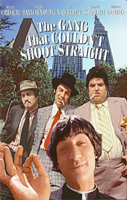 BUY IT AT AMAZON: CLICK HERE!
BUY IT AT AMAZON: CLICK HERE!
STUDIO: Warner Bros. Home Entertainment
MSRP: $19.98
RATED: PG-13
RUNNING TIME: 94 Minutes
SPECIAL FEATURES: Theatrical trailer
The Pitch
"It’s The Godfather meets The Ladykillers!"
The Humans
Jerry Orbach, Robert De Niro, Jo Van Fleet, Leigh Taylor-Young, Lionel Stander (1941), Herve Villechaize (Tattoo from Fantasy Island).
The Nutshell
Kid Sally Palumbo (Orbach) is the smallest of small-time crooks in the employ of mafia boss Baccala (Stander). He’s constantly outclassed by his rivals, both within and without the gang. Tensions mount and the whole of New York City baits its breath, expecting a full-scale gang war to erupt at any moment. Fortunately for the good citizens of New York, this gang war is being perpetrated by Kid Sally, whose cunning and fortitude measure only slightly above the level of wet cement — which, incidentally, is where the rest of his gang rank.
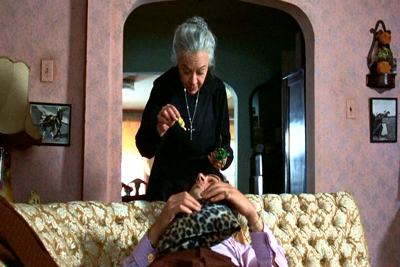
Act, boy, act!
The Lowdown
It’s a farce! An honest-to-Odin farce. We don’t get many comedies of this caliber or style anymore, despite the Coen Bros. attempt to remake the Alec Guinness classic The Ladykillers. In good ol’ literary terms, a farce is a drama that doesn’t hesitate to throw in bizarre situations or physical comedy. These comedic intrusions function more to keep the progression of the film light and quick than to shamelessly dig at the audience’s ribs for a laugh. It’s a definition that works well for The Gang That Couldn’t Shoot Straight, which is both nimble and fun.
One of the key differences between a farce and a comedy is that a farce tends to be anchored by a core dramatic performance. In Gang, Jerry Orbach fills that role with aplomb. He plays Kid Sally with a rudeness, a convincing ambition that has nothing supporting it in the way of intelligence. He’s a blowhard, with a misguided sense of entitlement, and he isn’t funny by any stretch of the word. His is a steady center for the narrative, like the eye of a storm around which boil incompetence, harebrained schemes, and monumental failures.
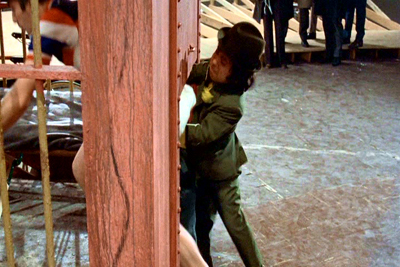
Tattoo finally gets his own fantasy.
Counterpoint to Kid Sally is Robert De Niro’s earnest portrayal of Italian scamp Mario, who is in America not entirely legally, and plans to take advantage of every second he’s got. He’s an opportunist, plain and simple, climbing the ladder from petty theft, to larceny, to conspiracy as he gets intertwined with the Palumbo gang via Kid Sally’s sister, Angela (Taylor-Young). De Niro seems to have a blast in this role, energetically adapting to a new country. His arc calls for the most emoting out of any in the film, and he nails it through the mildly confused filter of a man buffered by a culture gap.
Surrounding these twin stories, which cross over each other and then continue on in their separate directions, are a host of bungled murder plots and crime sprees. The succession and escalation of these ill-advised jobs grow more and more entertaining as they build up to the conclusion. They start with trying to put out simple hits on Baccala’s henchmen, and progress on to co-opting a male lion to help them collect protection money, and end up convincing Mario to play the part of a priest to keep tabs on Baccala before an assassination. That last is particularly funny, especially with Mario’s off-the-cuff responses to Baccala’s confessions.
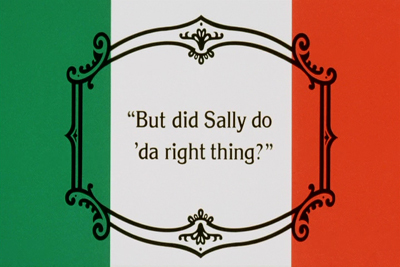
Yep. Right through the goddamn window.
In keeping with the tradition of the farce, the third act isn’t a laugh-a-minute extravaganza, but actually a sweet, subdued bit of dramatic interplay between De Niro and Taylor-Young, plus a few increasingly desperate antics from the Palumbo gang. Both plotlines wind up in bitter territory, manifesting as defeat. It’s these twin defeats that leave an impression when the credits roll: Kid Sally by his own incapability, and Mario by his grudging sense of honor.
Farces like Gang have an opportunity to dig their hooks into audiences that other films pass up. They’re realistic in a sense that doesn’t mesh with either strict comedies or strict dramas. Sure, you can have the gritty realism of a drug opera, or the screwball comedy of the Marx Bros., but life is composed more of earnest, misfired intentions and the resultant failures than eloquent monologues or clever wordplay. The thesis of a farce is: sometimes, you’ve just gotta laugh. With terrific performances from pre-star stars and a script full of inertia, The Gang That Couldn’t Shoot Straight is a great example of the whole genre.
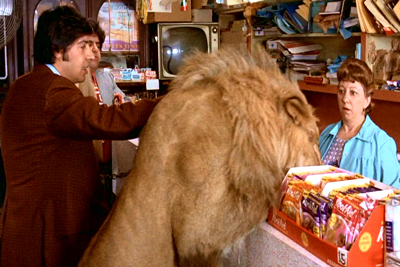
Like most child stars, Simba was reduced to bit parts in his twilight years.
I hear he’s got a reality show upcoming.
The Package
The disc feels rushed in its production values. The transfer and sound are both underwhelming, though possessing no standout faults. I wouldn’t expect a remastered soundtrack, but something given a bit of clean-up to take down a few issues with sibilance and sudden volume shifts would have been appreciated. Likewise, the transfer could have stood a bit of gamma correction somewhere along the line to keep the thing from going too bright.
No bonuses except for a theatrical trailer, which is a crying shame.
7.7 out of 10